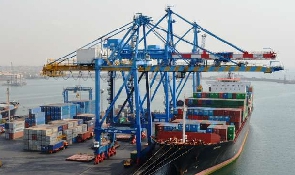Data emanating from the Customs Division of the Ghana Revenue Authority reveals that import duties generated for government reached a high of GHc1.2 billion in June, the first month in which the controversial Integrated Customs Management System was fully deployed across all points of entry for goods into Ghana.
Instructively, GRA claims that prior to the switch over to the new platform, its predecessor, the National Single Window System operated by GC Net in partnership with West Blue Consulting, was generating a monthly average amount of GHc940 million.
This new data tends to justify government’s insistence on sticking with the new platform deployed by South Korea’s CUPEA in collaboration with its local partner, Ghana Link, despite the technical problems that have dogged the roll out of the new platform since it was piloted a few months ago, over which the clearing and forwarding community has expressed dissatisfaction.
Government officials are enthused with the revenue performance pointing out that it has improved despite the adverse impact of the COVID 19 pandemic on trade volumes. This, they argue, suggests even better revenue improvement when the pandemic eventually subsides.
Public revenue collection has become even more crucial for government than usual as the impact of the coronavirus outbreak has drastically curbed its traditional sources of revenues even as its health and social intervention spending have been driven upwards dramatically.
Although revenue collection data for the sea ports – which are the biggest conduits for importation and thus the biggest sources of import duties – are not yet available, data for Kotoka International Airport and the land points of entry indicate sharply rising revenues. For instance import duty revenues from KIA for June, at GHc55.4 million, was up 20 percent over the GHc46 million generated in June 2019, when trade activities were not curtailed by travel and trade restrictions.
Importantly, the data further suggest that as the deployment of ICUMS gradually overcomes the major operational shortcomings that dogged its initial rollout, revenues are rising sharply by the month. For instance, revenue from the Aflao land border for June was GHc4,718,082.8, up from just GHc791,183.50 in March when ICUMS was going through an unsatisfactory pilot phase. Similarly, revenue generated in June from the Elubo land border was GHc4,038.105.31, up from GHc637,462.78 in March. Even more instructively, whereas no significant revenue was generated from the Jamestown Customs office in March, it reached GHc 9,523,556 in June.
Attention is now shifting to the problems still dogging the processes deployed by ICUMS which are causing delays in clearing of imports to the chagrin of shipping agents. Stakeholders meetings are ongoing.
Just last week the latest one was organized by the Accra Airport sector of GRA’s Customs Division, convened by Sector Commander Thomas Daniel and the Head of the ICUMS Implementation task force, Emmanuel Ohene.
Business News of Wednesday, 8 July 2020
Source: goldstreetbusiness.com

















